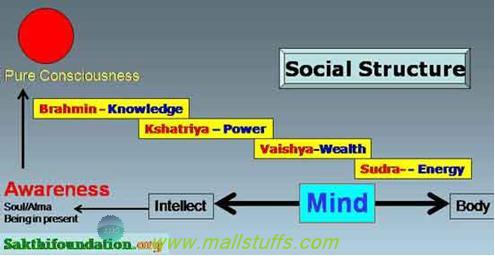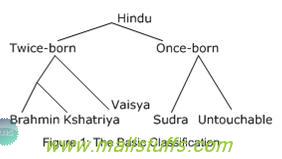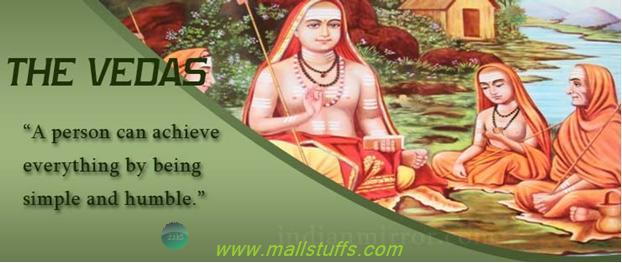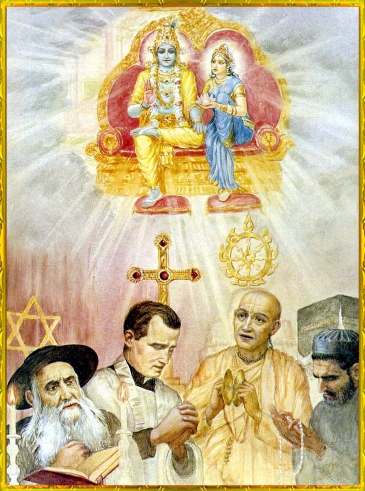
Vedas Quotes Against Present Caste System
Please read part 1-Caste system before reading this post.
When I say Vedas quote against caste system, I mean to say Vedas quote against discrimination and wrong practices followed in todays caste system. In my previous article, i discussed on why caste system was the need of ancient indian society. Since the original caste system is no longer diligently followed, today's caste system is of no use and the people fighting with each other on the name of religion and caste are infact mocking the traditional caste system
It is true that on birth, one get his caste according to his karma in previous life. So, one gets birth in a Brahmins family because of his good deed and extreme penance in his previous birth. Similarly, one gets a birth in a kshatriya family because of remarkable display of bravery, courage and good leadership in his previous life. However, It is not always the case. There are many verses which says that person can shape his caste as per his activities (karma) and not by mere inheriting the caste of father on his physical birth. i.e. person caste changes from one to another depending upon the depth of knowledge he has and also due to the effective result of his deeds, karma and spiritual activities.
So, son of a vaishya can become a brahmin but it needs training and penance. Morever, A son of brahmin can become a khatriya if he is equipped with great physical strength. In any such cases, skilled training and Purification ceremonies(samskaras) is required. If any brahmin fails to learn all religious rituals and sanskara then he is no longer regarded as a Brahmin and is considered as a shudra (Lowest caste). Similarly, if a kshatriya fails to display his courage, bravery and fighting skills, then he becomes a shudra. So, a person caste is not automatic at birth, as is generally accepted now.
Anyone can be a Brahmin, Kshatriya Vaishya or shudra
According to vedas, there is not much diffrences between these four varnas. On physical birth, every newborn is considered as Brahmins. All living beings are treated equally on his birth by the Creator then according to the guna, deeds and karma of the individual, one gets his new varnas(Caste). Those who are interested in worship,devotion, spirituality and relgious rituals and teachings becomes brahmins whereas those who are fond of desires and pleasures, with attributes of wrath, severity,courage and passion, become Kshatriyas.

Those who like cattle-rearing, trading, agriculture and possessed qualities of Goodness and Passion become Vaisyas. Those who are fond of doing service and injuring other creatures blind folded in their cupidity, - engaged in impure activities like black magic, animal sacrifices become Sudras.
So individual belonging to these four orders have the right to choose their occupation provided they perform all pious duties and activities of that varna.
What the above vedic verses actually means?
This verse means that everyone is a brahman on his physical birth then based on his deeds, activities and education, one becomes a Vaishya,shudra,Brahmin or Kshatriya.This change of varna according to his karma and gunas is considered as the individual second birth. Hence, The top three Varnas are called Dwija(twice-born).Those who choose to remain uneducated or do not possess the appropriate skills to undergo training are not discarded from society but work as Shudra and perform service oriented activities for the society.
Brahmin son becomes a shudra on failing in his education. Similarly, Sudras(Servants) can become a Brahmin, Kshatriya or Vaishya on completing relevant education and rituals. So, the person occupation is based on merit, the same way degrees are given today. This second education is called as yajnopaveet which can be later taken away if the person fails to follow the conduct of chosen occupation.
 In this Kali-yuga,samskaras are not performed diligently and the gurukuls(Training schools), are no longer operational. So, the olden technique of training and purificatory ceremonies is no longer performed. So, present day brahmins having no knowledge of priestly rituals should be called as dvija-bandhus unless they do activities of a brahmins. You may have a law degree but if you don't practice law, you will be considered as a lawyer just for namesake. So, in present day, since very few perform training or education of any kind, Saying about caste is just an absurd thinking. In this modern world, Caste system is no longer relevant since only 1% of the Indian population may be following the dharma and duties of their caste diligently.
In this Kali-yuga,samskaras are not performed diligently and the gurukuls(Training schools), are no longer operational. So, the olden technique of training and purificatory ceremonies is no longer performed. So, present day brahmins having no knowledge of priestly rituals should be called as dvija-bandhus unless they do activities of a brahmins. You may have a law degree but if you don't practice law, you will be considered as a lawyer just for namesake. So, in present day, since very few perform training or education of any kind, Saying about caste is just an absurd thinking. In this modern world, Caste system is no longer relevant since only 1% of the Indian population may be following the dharma and duties of their caste diligently.
Conclusion:
To conclude, today's caste system is just for namesake and a mockery of the original Vedic Varna system. Caste system is applicable to only 1% of the Indian population and others are just trying to showoffs themselves as better than the others. Most Indians have lost the basic essence of caste system but unfortunately, caste still plays a major role in Indian marriages, religious belief and superstitions.
This is Kaliyuga and all I can do is spreading awareness through articles and condemn present discriminative caste system.
Let us see the various quotes from Vedas which speak against present caste-based system

From the RIGVEDA:
1) "We all have diverse plans and thoughts and diverse is the thinking of men. The carpenter craetes wooden objects, physician heals diseases, priest worship Gods." (Book 9, Hymn 112.1)
Conclusion: All men's are born to do some specific task for society for which they are respected for their excellence.
2) "Myself a bard, father a physician, and my mother does the task of grinding the corn" (Book 9, Hymn 112.3)
Conclusion: Bard (can be sudra, vaishyas, kshatriya or Brahmin), physician (Brahmin doctor), grinding mills (sudra occupation). This vedic verse clearly shows diffrent profession followed within the same family
3)". The man enlightened by spiritual knowledge becomes perfect to speak directly to the gods." (Book 5, Hymn 65.1)
Conclusion: It says man needs to be enlightened to communicate with god with no reference to his caste, creed or religion.

Enlightened preists trying to communicate with god through their own mode of worship
4) "Our Fathers of the lowest order attain higher order based on their skill or of lower order may attain the highest order." (Book 10,Hymn 15.1-)
Conclusion: It talks about attainment of lower caste from higher caste or higher caste from lower caste.
5)"May the gods grant luxuries and pleasures to the liberal than the terrifying.(Hymn 185.9, book 1)
Conclusion: It says liberal men irrespective of their caste get all the riches of life.
From the YAJURVEDA:
6) "May gods choose a man with no rival, for mighty dominion, for mighty rule and great splendour. such a man is the perfect anointed king, O subjects. He is the lord of his subject, sovereign of knowledgable Brahmins. O all gods protect him." (Prapathaka 8, Hymn 8.10)
Conclusion: It says courageous man is worthy of becoming a king no matter the varna he belongs to
7) "O Agni, may your friendship helps all mortals. May you guide and prosper all. May all mortals praise you for riches, glory and fame." (Prapathaka 3, Hymn i.4.46)
Conclusion: It says all mortal with no reference of their varna.
8) "O Agni, give glory to Brahmins, set luster to sudras, set luster in our vaishyas, set luster in our kshatriyas." (Prapathaka 7, Hymn 7.6)
Conclusion: Above verse is not discrimination since brahmins are already enlightened because of their depth spiritual knowledge. This verse ask lord agni to enlighten remaining three varnas
9) "O Agni. each fault done in forest, society or a village, each sinful act committed to Vaishya or shudras by preventing their religious act, you are the only expiation." (Prapathaka 8, Hymn 8.3)
Conclusion: this verse states that people preventing religious act of lower caste should be punished.
10) "He who possess both Nescience and knowledge simultaneously, becomes immortal through by knowledge." (Isa Upanishad - verse 11)
Conclusion: It says only knowledge and nescience is needed to become immortal with caste playing no role in determining immortality.
In this article, we saw how the vedas quote against present caste system. Everything about present caste system is utterly nonsense and of no use since the original meaning, teachings and authority of caste system are lost in the pleasures, desires and comforts of this modern materialistic civilization. All modern concepts rlated to Caste system are void and useless. Caste based reservation and promotion is used as an effective tool of vote bank politics by politicians. Prohibition of inter-caste marraige and honour killing is example of ignorance, nescience and lack of knowledge of illiterate rural indians. Dute to an increasing caste based dicrimination, There is a rising need to abolish the current caste based system but i don't see it happening because the modern men are weak and blinded by power, ignorance, desires, greed, materialiastic pleasures and comforts etc. Hope the future generations take an effective step in discarding the present caste system.
Note: Images used on this website
are either a production of Bhaktivedanta Book Trust(https://www.krishna.com), Iskcon
Foundation or were found in google search under "Free to use and share". If any
of the images presented here violates copyright issues or infringes anyone copyright
or are not under "Fair use", then please bring it to our notice. Read
Disclaimer for more.
Share this to your friends. One of your friend is
waiting for your share.
Related Articles
Science in Hinduism-Motion of earth around sun
What makes a Hindu proud of their cultural heritage
Why cow is sacred to hindus
Bhagavad gita quote against caste system
Bhagavad Gita Poetic Translation-Text 2
Ill effects of caste system
Bhagavad Gita Poetic Translation-Text 1
Why number 108 is holy and auspicious in Hinduism
Why gayatri mantra is the most powerful mantra
Science in Hinduism-Invention of numeral system
Post Comment